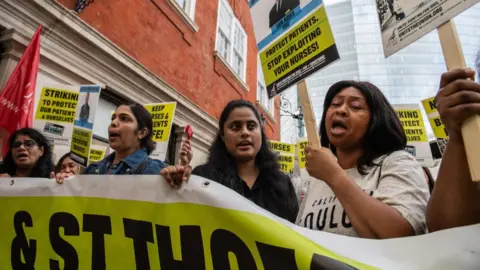In a significant development for healthcare workers in England, nurses are anticipated to overwhelmingly reject a proposed pay deal, setting the stage for potential strikes later this year. As reported by the BBC, the Royal College of Nursing (RCN) has been conducting a consultative vote regarding a meager 3.6% pay rise that was deemed “grotesque” by union leaders. This reaction stems from frustration over the fact that nurses are being offered a lower pay increase compared to other professions, such as doctors, teachers, prison officers, and armed forces members.
The RCN plans to make an announcement regarding the results of this indicative vote later in the week. Preliminary insights suggest that the outcome will reflect a strong disapproval of the pay rise among the nursing staff. Notably, participation levels in the vote are projected to exceed the critical 50% threshold necessary for initiating industrial action. As a response to the perceived inadequate compensation, the RCN intends to engage with government officials over the summer. Their goal is to negotiate a more acceptable deal, thereby averting the need for a formal ballot for strike action in the autumn months.
This situation follows the government’s acceptance in May of the recommendations from the pay review body, which proposed a 3.6% increase for nurses this year. However, the RCN’s leadership has voiced that such a raise fails to reflect the value of nursing staff, particularly given their essential role in the National Health Service (NHS). A spokesperson for the union articulated concerns about how nursing staff feel undervalued and stressed the urgency for the government to make strides in addressing this sentiment.
Concurrent to the developments within the nursing sector, the GMB union, which represents a multitude of health workers including ambulance crews, has also rejected the same 3.6% pay proposal during an earlier consultative vote. This vote showed a 67% majority against the pay award for the financial year 2025/26, indicating widespread discontent among health workers regarding pay structures. GMB’s national secretary, Rachel Harrison, has formally reached out to the Health Secretary, Wes Streeting, requesting a meeting to discuss crucial pay issues and other significant matters affecting their members.
Additionally, the issue of pay for healthcare workers is compounded by the ongoing strikes among resident doctors in England, who commenced a five-day strike recently after negotiations with the British Medical Association failed. The unrest across various healthcare sectors highlights a growing frustration with the government’s handling of pay and working conditions within the NHS.
A representative from the Department of Health has remarked on the impact of these strikes, noting that while it may not be possible to eliminate disruptions within the NHS entirely, efforts are being made to minimize such disruptions as much as possible.
As these tensions rise, the future of healthcare services in England remains uncertain, with the potential for strikes looming large. Nurses, as the largest segment of the NHS workforce, are clearly expressing their dissatisfaction with current pay structures. This could lead to broader discussions about not only the headline pay but also the overall compensation frameworks governing their work conditions. The outcome of the upcoming votes and negotiations will likely set the tone for the healthcare landscape in the months to come, reflecting the urgent need for appreciation and rightful compensation of nursing staff and healthcare workers across England.












